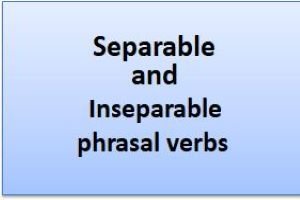Separable and Inseparable phrasal verbs:
A phrasal verb consists of a verb and one or more components, which is most commonly an adverb or a preposition. Phrasal verbs can be either separable or inseparable. A separable phrasal verb is one where the verb and particle can be separated by an object, typically a noun or pronoun. For example, in the sentence “I’m looking forward to seeing you,” the verb “seeing” is separable from the particle “forward.” An inseparable phrasal verb is one where the verb and particle cannot be separated by an object. For example, in the sentence “I’m putting up with this nonsense,” the verb “putting” is inseparable from the particle “up.”
|
Separable |
Inseparable |
| Pick up | Look after |
| I will pick my brother up | Who looks after the baby? |
| I will pick up | Who looks after her? |
| I will pick him up |
Separable phrasal verbs:
Phrase verbs can be separable or inseparable. If a phrasal verb is separable, it means you can separate the two words and put the direct object in the middle if you want. But if it is inseparable,
A separable phrasal verb that permits an object will be positioned in the middle of the verb and its particles. or behind an entire phrasal object.
Separable verbs used with objects mean that they will allow using something between the verb and a preposition or can use it in the end, just as we do with inseparable verbs.
The verb and particle can be part of or together.
- They have called the meeting off.
- They have called off the meeting.
Should be separated when you use the personal pronoun.
An example of separable phrasal verbs:
| Verb | meaning | Example |
| Give out | Distribute | Our boss gives out prize money at the meeting. |
| Hand over | To give something to someone | He handed over all his assets. |
| Have over | Have someone at your home as a guest. | I should have it over for dinner soon. |
| Leave out | Not include someone or something | We left out important details for the boss. |
| Let down | Disappoint | Please do not let me down this time. |
| Payback | Return the money you borrowed | Can you pay it back to me by today? |
|
Put off
|
Postpone | He put off the meeting until Tuesday. |
What are inseparable phrasal verbs?
An inseparable Phrasal verb: it does not allow an object to take a position in the middle of a verb and a particle; it means whenever it wants to be used, it must always follow a complete phrasal verb. The verb and particle should be used together.
- Who looks after the baby when they are at work? (Correct)
- Who looks after her when you are at work? (Correct)
- Who looks the baby after you are at work? (incorrect)
- Who looks her after when you are at work? (incorrect)
Some phrasal verbs are inseparable because they do not take an object.
- I get up at 7 a.m.
Phrasal verbs with two particles are also inseparable; even if you use a personal pronoun, you put it after the particles.
- I did not get along with my stepbrother when I was a teenager.
- The concert’s on Friday. I’m Looking forward to it.
Examples of Inseparable Phrasal:
| Verb | meaning | Example |
| Call on | Ask to recite in class | The instructor called on students in the back row. |
| Call on 2 | Visit | The old minister continued to call on his stick parishioner. |
| Get over | Review | The student went over the material before the exams. They must have gone over it twice. |
| Go through | Use up; consume | They went through most of the country’s coal reserves in one year. Did he go through all his capital already? |
| Look after | Take care of | My friend promised to look after my dog while I was gone. |
| Look into | Investigate | The police will look into the possibility of theft. |
| Run across | Find by chance | I ran across my old classmate at the college reunion. |
|
Run into |
meet | John ran into his English professor in the hallway. |
|
Take after |
resemble | Sarah takes after her mother. |
Below are inseparable phrasal verbs:
| 1. Call for | 13. Come across |
| 2. Come from | 14. Go On |
| 3. Look into | 15. Run against |
| 4. Tire of | 16. Turn into |
| 5. Come down with | 17. Look after |
| 6. Get around | 18. Look forward |
| 7. Go over | 19. Face upto |
| 8. Hang around | 20. Make-up for |
| 9. Settle on | 21. Stand upto |
| 10. Stick to | 22. Take after |
| 11. Run against | 23. See about |
| 12. Pick on | 24. Stand up for |

